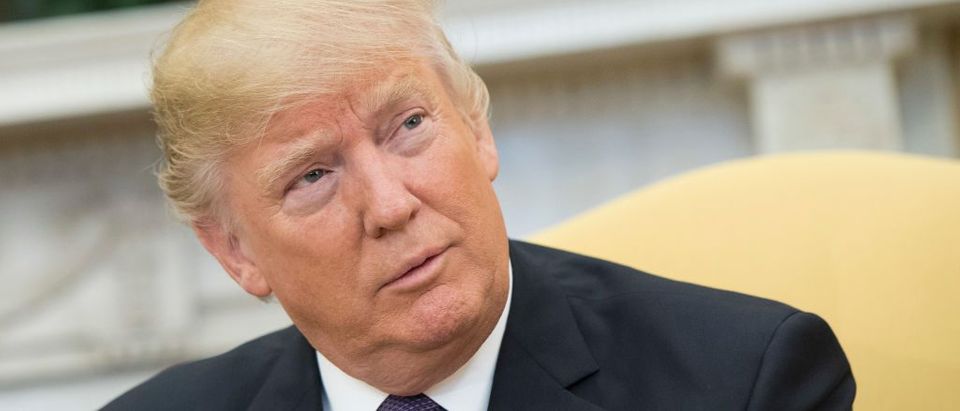President Donald Trump has been a very busy man during his first three weeks.
He has issued an executive order mandating a new military plan for the Islamic State and sent out his national security adviser to warn Iran that it are now “on notice.” His administration has enacted additional economic sanctions on twenty-five Iranian individuals and entities in response to Tehran’s most recent ballistic missile test. Trump has authorized his first special operation counterterrorism raid deep into Al-Qaeda’s heartland in Yemen. Not to be overshadowed, Trump has phoned dozens of foreign leaders, including Ukrainian President Petro Poroshenko, where they discussed ways to tamp down the violence in Eastern Ukraine.
Throughout it all, President Trump has relished in the role of being the new, tough guy on the block. Entire countries have been put “on notice,” by the new president; the administration has implied that more forceful measures are just around the corner if America’s adversaries don’t start behaving; and Trump has even sent sharp warnings to traditional allies that they better prepare for a fairer playing field on international trade. The 45th President is sending an unmistakable and clear message that goes to the heart of what Trump’s message is about: The United States will no longer be the suckers being taken for a ride by other countries.
But as Trump establishes the tone of his administration, improves relationships with our allies and perhaps builds mutually-beneficial relationships with our adversaries, it’s critical that his words and actions are clearly understood—and it’s essential these messages further America’s policy goals rather than limit America’s ability to accomplish them. This is especially true of powers that seek to recover lost glory (like the Russians) or that have historically tested or outright opposed U.S. interests (like Iran and North Korea). A disconnect between major countries may turn a minor dispute—like weapons testing—into a regional standoff. .
Trump, of course, isn’t the first U.S. president to embrace the tough-guy role. As a the consummate dealmaker, he likely identifies the trait as a useful card to play when interacting with his foreign counterparts — especially if the U.S. is in the middle of an intense negotiating process. Sounding strong in front of the microphones, though, is rarely enough to push other countries to travel down a road that they simply don’t want to go. And as President of the United States, Trump’s statements, press conferences, and late-night tweets have the power to rile up world leaders and introduce an additional amount of angst and anxiety in an international system that is already full of it.
None of this is to say that President Trump shouldn’t act tough when it’s warranted — yet because the international system is so combustible right now, the Trump administration cannot — in fact, should not — consider toughness as a panacea to the world’s urgent challenges. Acting tough all of the time, regardless of the circumstances that may pop up, has the dangerous effect of limiting the kind of flexibility and pragmatism that is absolutely critical when opportunities present themselves. It shuts down the entire foreign policy toolbox that the United States has at its disposal.
In certain circumstances, threatening the use of military force has worked to achieve a policy goal. But this is often the exception rather than the rule. U.S. history is full of examples where U.S. presidents issue an ultimatum or a threat of military force — thinking that the operation will be smooth — only to discover years later that the policy was ill-advised and the military strategy did not account for the rule of unintended consequences.
The lesson for President Trump and his national security officials is therefore clear-cut but enormously important to America’s reputation in the world: Before turning tough rhetoric into actual policy, you must think through every possible scenario, especially the unintended consequences that may arise if that policy is put into force.
Isaac Newton’s Third Law of Physics applies just as perfectly to geopolitics: “For every action there is always an equal and opposite reaction.”
Threatening to use the U.S. military against Iran will produce an equal and opposite re-action from the Iranians, actions that may include more ballistic missile launches, more support for proxy forces in the Middle East, and the sponsorship of more terrorist attacks on U.S. facilities in the region. Lashing out at North Korea will perhaps convince Pyongyang to double-down on its nuclear weapons development program and shut the door permanently to the renewal of multilateral negotiations. This truth extends to all our allies and adversaries. Preventing the Chinese navy from accessing the shoals and islands Beijing regards as its turf (something that Secretary of State Rex Tillerson seemed to suggest during his confirmation hearings) would limit Washington’s ability to elicit China’s cooperation on other security issues, nuclear proliferation in North Korea foremost among them. Strength, in other words, often begets strength; backing-down in these situations is rarely an option for countries like Russia and China, both of which are trying to cultivate the image of growing powers to be reckoned with on an equal footing.
Foreign policy is a lot like boxing. The best boxers in history not only have a powerful left hook, but quick foot-work, the maneuverability to duck a punch, and the flexibility to pick their spots. A boxer that only has mass is just as likely to lose a match than win it.
Right now, Donald trump is the boxer with the big arms. If he wants to become the winner in the ring, he needs to recognize that toughness alone is not sufficient. Instilling a level of discipline within his national security team, constantly asking his advisers to determine what the unintended consequences of a policy will be, and thinking four steps ahead are presidential qualities as important as exhibiting strength.
Daniel DePetris is a fellow at Defense Priorities.












